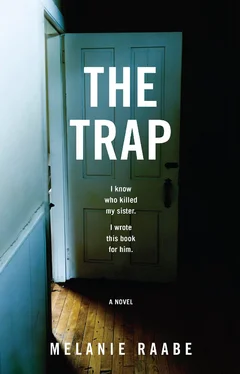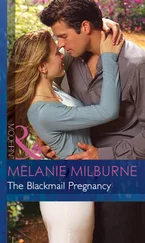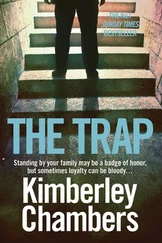“Yes?” came a faint voice. “Who is it?”
“Hello, it’s Sophie Peters — Britta Peters’s sister.”
“Oh. Ah ha. Come on up, Frau Peters.”
The door buzzed. Sophie gritted her teeth and found herself in the hallway. She hurried as quickly as she could past the door to Britta’s ground-floor flat and on toward the stairs. On the second floor she was met by an old lady with smartly cut short hair and a pearl necklace.
Sophie held out her hand.
“Come on in,” the woman said.
Sophie followed her along a passage into an old-fashioned living room. The pastel colors, the lace doilies, the antiquated wall unit and the lingering smell of boiled potatoes were improbably soothing.
“Nice of you to come so quickly,” the old lady said, after offering Sophie a seat on the sofa and a cup of tea.
“But of course,” Sophie replied. “I came as soon as I got your message.”
She blew on her tea and took a small sip.
“The neighbors said you’d been asking whether anyone had seen anything.”
“I thought people might tell me more than they’d told the police,” Sophie replied. “You never know. To be honest with you, I go mad at the moment if I don’t get out of the house a bit.”
The old lady nodded.
“I know what it’s like,” she said. “I was the same when I was a girl — always up and doing.” She took a sip of her own tea.
“I was at the doctor’s when you were asking around,” she said. “That’s why you didn’t find me in.”
“I see. Have you told the police what you saw?” Sophie asked.
“Oh, them…,” said the old lady with a dismissive gesture.
Sophie frowned. “But you did see somebody?”
The old lady began to rub away at an invisible stain on her dress. Sophie put her tea down and leaned forward. She could barely control her trembling hands.
“You said you’d seen the man who killed my sister,” she prompted her, when the woman showed no sign of volunteering any information.
The old lady stared at her for a moment, then gave a loud sob and slumped down in her chair.
“I still can’t believe it,” she said. “Such a lovely girl. She always did my shopping for me, you know. I’m not as steady on my feet as I used to be.”
Sophie watched the woman cry for a few moments. She wasn’t capable of feeling anything much at the moment. She rummaged in her bag for a tissue and handed it to the woman, who took it and dabbed at her eyes.
“You said you’d seen somebody,” Sophie repeated, when the old lady had calmed down a little. Every muscle in her body seized up as she waited for the reply.
Going over the conversation in her head as she drove along the motorway, Sophie could hardly contain her anger. The whole thing had turned out to be a huge disappointment. The woman was lonely and had fancied a chat with someone about Britta, who had visited her regularly. On top of everything else, she had cataracts and was nearly blind. Sophie had listened to her for a little while longer and then made a dash for it.
She thought of Britta as she overtook a car — Britta, who had helped old ladies with their shopping and must have listened to their stories with the patience of a saint.
Sophie drove as if in a trance. Eventually, she slowed the car and flicked on the indicator. She had reached her destination.
The young woman who opened the door flung her arms around Sophie’s neck.
“Sophie!”
“Hello, Rike.”
“How lovely to see you. Come in. We’ll sit in the kitchen.” Sophie followed Friederike into the house.
“How are you? And your parents? How are they bearing up?”
Sophie was used to these questions by now and was ready with a stock phrase. “We do our best,” she said.
“You were all so brave at the funeral.”
Friederike’s lower lip trembled. Sophie opened her handbag and, for the second time that afternoon, took out a tissue.
“I’m so sorry,” Friederike said tearfully. “I should be the one comforting you!”
“Britta was your best friend,” Sophie replied. “You have as much right to be sad as I do.”
Friederike took the tissue and blew her nose.
“It was so odd at the funeral,” she said. “Throwing flowers on the coffin, when Britta hated cut flowers.”
“I know,” Sophie said and almost had to smile. “It was the same when my parents and I were planning the funeral. The undertaker looked at us as if we were mad when we said that Britta didn’t like them. ‘What do you mean? All women love flowers!’”
Friederike gave a sniffly laugh.
“Not Britta,” she said. “The poor flowers. Imagine, you’re standing there in a meadow, minding your own business, and somebody comes along and snaps off your head.”
The two women had to laugh.
“Sometimes Britta could be a real fruitcake,” Sophie said. Friederike smiled, but the moment passed as quickly as it had come. Tears welled up in her eyes again.
“It’s so unbelievably awful. I can’t get my head around it.” She wiped her tears away. “Did you really see him?”
Sophie winced.
“Yes,” she said simply.
“My God. I’m so glad you’re all right, at least.”
She cried for a while, sobbing loudly, then made an effort to pull herself together.
“Do you know what I miss most?” she asked.
“What?”
“Ringing Britta when I need advice,” Friederike said. “It’s weird. I’m three years older than her, but she was definitely the more grown-up of the two of us. I don’t know what I’ll do without her.”
“I know what you mean,” Sophie said. “Britta always said out loud the things everyone else was only thinking: ‘You’ve put on an awful lot of weight, my dear sister. Maybe you should be a bit more careful what you eat!’ ‘Sophie, are you sure Paul’s the right man for you? I don’t like the way he looks at other women.’ ‘That bag’s real leather, isn’t it, Sis? Are you all right with that?’”
Friederike gave a quick burst of laughter.
“That really does sound like Britta,” she said. “It’s funny. It used to annoy me sometimes. Now there’s nothing I’d like more than to hear one of Britta’s lectures on our plastic-polluted oceans, or the atrocities of factory farming.”
Friederike sniffed, then blew her nose.
“What did you want to talk to me about, Sophie?”
“I wanted to ask you something.”
“Go on.”
“Do you know if Britta had been seeing anyone lately?”
“A man, you mean?”
“Exactly.”
“No. Not since Leo left her.”
Sophie sighed. The crime of passion theory favored by the police (that much she had managed to glean from the interviews) was seeming less and less likely. Britta had not been in a relationship at the time of her murder.
“Why did they split up?” Sophie asked. “Britta never talked about it.”
“Because he’s a complete prick, that’s why. He even accused her of cheating on him.”
“Excuse me?”
“Yeah,” Friederike snorted. “Britta — unfaithful! Can you believe it? If you ask me, there’d been something going on for a while between him and that Vanessa he’s going out with now, and he wanted to blame the breakup on Britta.”
“Why would he have done that?” Friederike shrugged.
“It doesn’t matter now anyway,” she said at length.
Sophie nodded. Her heart sank. She hadn’t really believed the police would be proved right about the crime passionnel , but that didn’t stop her from hoping that Britta had been seeing someone in secret. Crimes committed within a relationship were almost always solved. But when there was no obvious connection between perpetrator and victim, it became tricky for the investigators, and the chances of solving the crime plummeted.
Читать дальше












